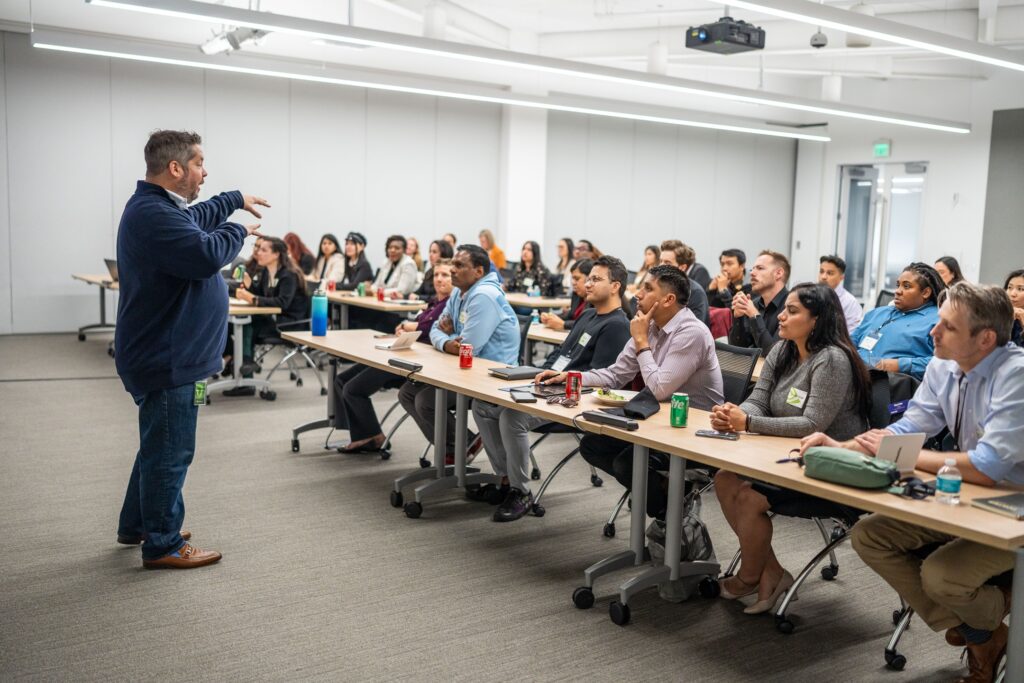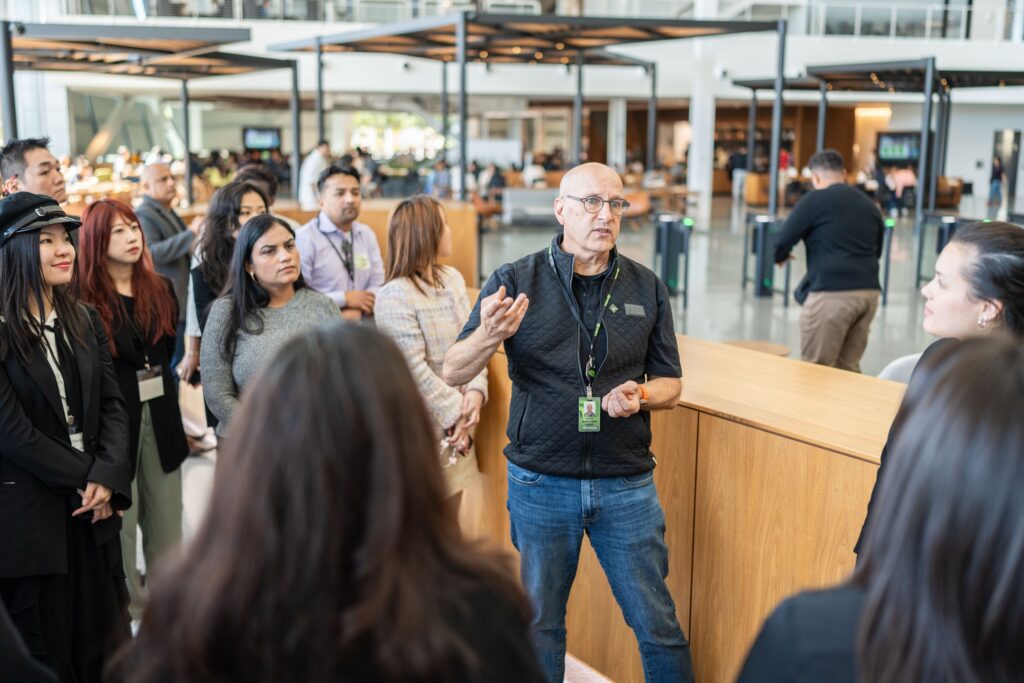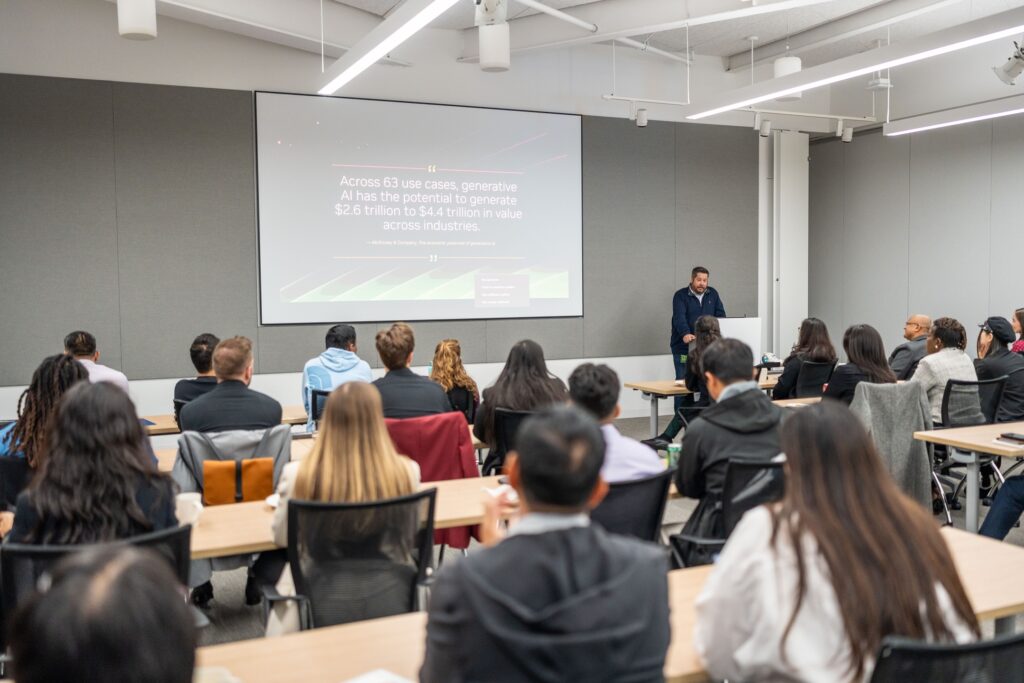Matt Hull on AI, Leadership, and the Foster Effect
NVIDIA VP Matt Hull reflects on scaling AI, staying humble, and the value of a Technology Management MBA
It’s not every day you get to step inside one of the world’s most transformative tech companies. But that’s precisely what Foster MBA students did on a recent visit to NVIDIA’s Silicon Valley headquarters—hosted by Foster school alum Matthew (Matt) Hull (MBA 2010), Vice President of AI Solutions Go-To-Market.
Between walking tours, real-time demos, and plenty of Q&A, Hull carved out time for a sit-down interview with us to talk about where AI is heading, what it’s like working at NVIDIA, and how his Foster Technology Management MBA (TMMBA) shaped how he leads today. Throughout the conversation, he shared reflections on his career, advice for future leaders, and why staying curious is one of the most essential traits in a world being reshaped by AI.
What does your role at NVIDIA entail?
Matt Hull: My job is to democratize artificial intelligence—build solutions that make it possible for any enterprise to adopt AI. We work with the broader ecosystem to bring together everything needed for successful implementations. Then, we partner with customers to deploy those solutions and help them leverage the power of AI.
What do you enjoy most about what you do?
Matt Hull: I love the pace. I wake up every morning and know the ball’s moved another 10 yards down the field. It’s exciting to be part of that. I also get to work across so many different industries. There’s not a single industry out there that isn’t looking to adopt AI—agriculture, manufacturing, financial services, you name it. It’s never dull.

You mentioned how different industries are approaching AI. What kind of momentum are you seeing?
Matt Hull: Two years ago, ChatGPT woke everybody up. For consumers, it was a fun tool to play with. But for enterprises, it was a signal: “We need to take this seriously.” They moved from curiosity to investment. We’re seeing companies come out of the R&D phase and start scaling.
At first, they asked, “What’s the one use case for AI: customer service, fraud detection?” But now they realize there are hundreds of use cases. The question has become: How do we deploy AI at scale? How do we build the right foundations and layer our domain expertise?
Let’s go back in time a bit. Can you walk us through your early career and what led you to the TMMBA program?
Matt Hull: During undergrad, my roommate convinced me to get an internship through the University of Washington Foster School of Business, even though I wasn’t a business major. I ended up in executive recruiting—headhunting. Every day, I sat at my desk cold-calling these high-powered salespeople who were out traveling and making all this money. I thought, “What am I doing on this end of the phone? I want to be out there.”
Eventually, I joined Seagate Technology, working with clients like Google and Microsoft, where I helped design Xbox. At Seagate, I reported to the SVP of Go-To-Market. He didn’t have an MBA and saw that as a ceiling; he wouldn’t become CEO or EVP. He pushed me hard to get one.
Living in Seattle and working in tech, I wanted a program that was local, respected and focused on technology. The Technology Management MBA checked all the boxes. Honestly, I chose it at first because it was close to home—I was in Bellevue on the Eastside and didn’t want to drive to Seattle—and because it was only 18 months. I thought, “Perfect. I’ll get the stamp and move on.” But once I got into it, I realized, “Oh my God. This is an incredible program.” That was almost 15 years ago, and it changed everything.

What did you gain from the TMMBA that you weren’t expecting?
Matt Hull: I went into the program thinking I just needed the MBA credential, but I was amazed by how much I had actually learned.
One moment that sticks out: I was in a meeting discussing net present value—NPV—and someone looked at me and asked, “How do you know about that?” It hit me that I’d picked up so much through the program—finance, economics, marketing, supply chain. All the different areas of business. It gave me the language to speak across teams and the ability to see business holistically.
The Technology Management MBA gave me credibility. It allowed me to contribute in ways I couldn’t before. I didn’t expect that. I thought I was just checking a box, but it turned out to be way more valuable than I imagined.
How did the Technology Management MBA influence the way you lead?
Matt Hull: It helped me understand what other people do: their goals, how they’re measured, and what they care about. That awareness allows you to build real collaboration across functions. You stop looking at things just from your own silo and start seeing the ripple effects of decisions across finance, operations, marketing, and beyond.
That ability to think holistically and connect the dots across an organization has been a game-changer for me.
You’ve worked at a lot of large companies. What makes NVIDIA’s culture different?
Matt Hull: NVIDIA has the most unique culture I’ve ever been a part of. Our CEO, Jensen Huang, has 55 direct reports. That’s unheard of. We keep the organization flat. It’s not about hierarchy or politics—it’s about the mission.
There’s a saying here: “The mission is the boss.” You bring people together from across the company, and it’s not about who reports to whom; it’s about solving the problem. That agility lets us move fast and stay innovative.
We invest in things that don’t yet make money. Robotics is a great example. There’s no market today for AI-powered humanoid robots, but we’re investing heavily because we believe it’s the future. That willingness to bet on zero-dollar businesses makes this a really fun place to be.

What kind of people thrive at NVIDIA?
Matt Hull: People who don’t have egos. Curious people who ask, “What’s possible?” not just, “What’s already being done?” People who are quick learners—we’re working on things that nobody’s studied before.
I’ve interviewed candidates with amazing résumés but if they’re not a cultural fit, it won’t work. You have to be collaborative, flexible, and mission-focused. That’s what makes NVIDIA special.
What excites you most about the future of AI?
Matt Hull: The quality of life it’s going to bring. Think about cars and sitting and talking with your kids while the car drives you—or healthcare and early cancer detection, drug discovery, and genome mapping. AI is going to extend life and improve it in so many ways.
Yes, there’s fear and speculation. But I’m focused on the benefits, and they’re going to be tremendous.
How should business schools prepare students for this AI-driven future?
Matt Hull: AI is going to disrupt everything. It’s not just a tech topic. It’s going to affect law, marketing, supply chain, international relations, and even religion and politics.
Business schools need to incorporate AI into the curriculum now and teach students not just how to build models but how to apply them. AI isn’t a side project—it’s becoming the business itself. It will permeate every function.
To make it work, companies will need new organizational structures—connected tissue between groups that don’t usually work together. Executives, business leaders, IT, data teams—they all have to collaborate in new ways. Business schools must help students understand how to lead that kind of integration.

You’ve been a big advocate for AI education, including at the K–12 level. Why is that?
Matt Hull: AI will impact everything, so we need to start teaching it early. Some countries, especially in the Middle East, are already requiring AI education in elementary schools—not just how to code it but also how to think about its implications.
Schools like Foster need to lead at the university level. We’re collaborating now to integrate more AI into the curriculum and connect with nonprofits and innovators across the Seattle area and the Puget Sound. NVIDIA is here to support that work because it’s essential.
Looking back on your career, what lessons stand out?
Matt Hull: A big one is expanding your aperture, widening how you define the problem space. There’s a story I love about Coca-Cola. They were tracking their share of the cola market. It stayed flat, but revenue was dropping. Then they realized they weren’t in the cola market but in the beverage market. So, they expanded to water, juice, and wine.
It’s the same at NVIDIA. We started with computer graphics. Then, we realized that our chips could accelerate more than that. Then, we saw the need for data infrastructure. We kept expanding.
If you stay too narrowly focused, you miss opportunities. The broader your view, the more impact you can have.
Last question: Any advice for the Foster School community?
Matt Hull: It’s all about people. Companies don’t do business; people do. People buy from people. They work with people they trust. One of the biggest learnings in my career has been the importance of building real relationships.
You need to build trust even if you don’t always agree with someone. Do good work. Be humble. Don’t get caught up in self-promotion. Let your results speak for themselves.
The only reason I’ve been successful is because of the people around me and the relationships I’ve built with them.
Learn more about MBA programs for working professionals here.
